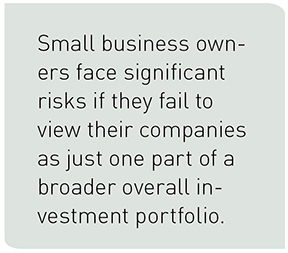HOME | ABOUT US | MEDIA KIT | CONTACT US | INQUIRE
HOME | ABOUT US | MEDIA KIT | CONTACT US | INQUIRE


 A strategy for putting your business into the proper context as an investment.
A strategy for putting your business into the proper context as an investment.Returns from a business or investments cannot be realized without taking some risks. Therefore, sound investment advice is rooted in the idea that it is wiser to manage risk than to attempt to eliminate it.
An important consideration for the business owner is managing the legal risks inherent in a business. Insurance is always the first line of defense. So to the extent you can reasonably insure against a business risk, you should do so. Another way to minimize the risk of the business is to protect your other assets from business liabilities. There are several common sense ways to do this.
It is usually beneficial to have a business owned by an entity with limited liability (such as a limited liability company or a corporation). The benefit is that you will not be personally liable for the liabilities of the business. If you are not personally liable, then your other assets (such as an investment portfolio) cannot be reached by business creditors.
There are several major exceptions to your personal liability. First, if someone is harmed due to your personal negligence, you will be personally liable for that. This is a good reason to have an umbrella insurance policy that insures your personal actions.
Second, if you personally guarantee company obligations, you will be personally liable to the extent of that guarantee. If you do have to give a personal guarantee, consider the benefit of having that debt secured by assets of the business so that it will be paid first if the business does not have the resources to pay all its liabilities.
Third, business creditors can reach your personal assets if they can successfully “pierce the corporate veil.” The ability of a creditor to pierce the veil is based heavily on the facts and circumstances. To provide protection from this, it is important for you to treat the company as an entity separate from you (separate bank accounts, books and records), follow formalities (like using the company name), and make sure the business is not too thinly capitalized.

Consider owning passive assets, such as real estate or valuable equipment, separate from the company that owns the active business. For example, such assets can be owned by a separate LLC or a trust for your children. Then these assets can be leased to the company that operates the business.
You also need to manage your personal portfolio as you accumulate assets over time. As a business owner, your investment in the business is an equity investment. Similar to publically traded companies, there is risk in business success, plus the additional issue of lack of liquidity. As this is most likely a substantial percentage of your net worth, it is all the stock investment you need at first. Until the business becomes successful, any excess savings should go to less risky assets such as bonds.
Over time, you should utilize tax-advantaged strategies under the umbrella of the business (such as 401(k), SEP IRAs etc.) as you acquire savings and seek to provide additional benefits to employees beyond direct compensation. At this point, the introduction of other equity investments would be appropriate to better diversify the investment portfolio with more liquid assets.
As your company becomes better established, consideration should be given to protecting from the risk of your retirement, disability or death. You should develop an exit strategy that will preserve the value for you and your family. The exit strategy may include an outright sale to a third party or tax-advantaged transfers to key employees or certain family members. It may include life insurance to provide for loss of cash flow, and planning to minimize any death taxes.
Make sure you have the appropriate legal documents in place that name the right people to be in charge to carry out these plans (and periodically review and update those documents). The people in charge include agents under a general power of attorney, successor trustees of a revocable trust, and/or executors of your estate.
You also need to identify those family members or third parties who can step in and successfully run the business in your absence, and then give them the authority and know-how to do so.